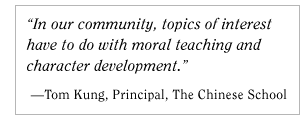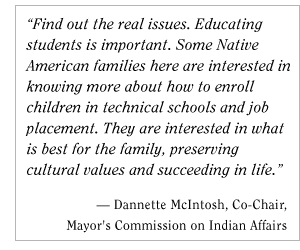|

The
more organizers know about the education issues important to minority
and culturally diverse communities, the more successful they are
in recruiting parents and community members. Why? Because they can
then design community forums with those issues in mind. This may
seem obvious, but too often agendas are designed without learning
what parents and community members want to talk about most, virtually
guaranteeing low turnout. For example, you may want to hold a meeting
about a proposal to increase funding for schools, but the community
wants to talk about the drop out rate. How do you identify the issues
your community cares about most? The answer is simple: ask your
community.
 Organizers interviewed by
SEDL say they learn first hand about local issues. They are good
listeners. They ask questions, probing for clarity and understanding.
They reach out to all types of people, from a well-known community
leader to a neighborhood grandmother. They set aside the time it
takes to research issues in-depth. Organizers interviewed by
SEDL say they learn first hand about local issues. They are good
listeners. They ask questions, probing for clarity and understanding.
They reach out to all types of people, from a well-known community
leader to a neighborhood grandmother. They set aside the time it
takes to research issues in-depth.
In addition to talking one-on-one with community members, here
are some more ideas to help identify which education issues matter
most:

 Ask
parents about their attitudes toward their child's school. Ask them
if their child is interested in learning. Is their child receiving
a good education? Why or why not? Do teachers talk with families
about their child's progress? Talk about these issues one-on-one
or in small, informal gatherings or during community group meetings. Ask
parents about their attitudes toward their child's school. Ask them
if their child is interested in learning. Is their child receiving
a good education? Why or why not? Do teachers talk with families
about their child's progress? Talk about these issues one-on-one
or in small, informal gatherings or during community group meetings.
Listening closely to what parents and community members say can
help organizers identify pressing issues and learn why some parents
are not more involved in efforts to improve schools. Parents may
feel they have no say in school reform and meetings focused on these
issues are a waste of time. Respond to parents' concerns by holding
public forums that address their issues. Slowly, you build trust
and cement relationships.

 One
of the most effective ways of gathering information is to attend
meetings of groups representing different community, cultural and
minority interests. Learn more about the issues and how perspectives
about public education vary from one group to another. These groups
provide an avenue to conduct formal or informal surveys. They can
open up doors for meaningful community conversations. Above all,
keep these groups informed of your work and next steps. Regular
follow-up and personal contact keeps these groups actively involved. One
of the most effective ways of gathering information is to attend
meetings of groups representing different community, cultural and
minority interests. Learn more about the issues and how perspectives
about public education vary from one group to another. These groups
provide an avenue to conduct formal or informal surveys. They can
open up doors for meaningful community conversations. Above all,
keep these groups informed of your work and next steps. Regular
follow-up and personal contact keeps these groups actively involved.

Often staff members at a local school can help identify leaders
in the community. They also know first hand about the challenges
facing their school and others in the neighborhood. Talk to teachers,
principals, counselors, bilingual specialists and students about
issues the school is grappling with. These issues may become the
centerpiece of future community forums.

 Learning
about the education issues confronting a community requires going
directly to the source. Arrange with owners of local businesses
to meet with employees on the job during lunch or work breaks. Find
out what's on their minds. Ask questions. Gather input. Consider
holding a neighborhood coffee or a Saturday breakfast meeting for
community members. Ask people what they think about schools and
how they would improve them. Learning
about the education issues confronting a community requires going
directly to the source. Arrange with owners of local businesses
to meet with employees on the job during lunch or work breaks. Find
out what's on their minds. Ask questions. Gather input. Consider
holding a neighborhood coffee or a Saturday breakfast meeting for
community members. Ask people what they think about schools and
how they would improve them.
Regardless of where or how you talk to people, remember why you
are there: to learn about their concerns. A strong grasp of the
issues confronting a community provides the backbone for a successful
public forum. Parents, community members and business leaders want
to know that the time they have spent with you will lead to something
concrete—a solution, a follow-up activity or action. Failing
to explain how their input will be used often makes it more difficult
to attract parents and community members to future meetings where
important decisions are made about the schools their children attend.
|